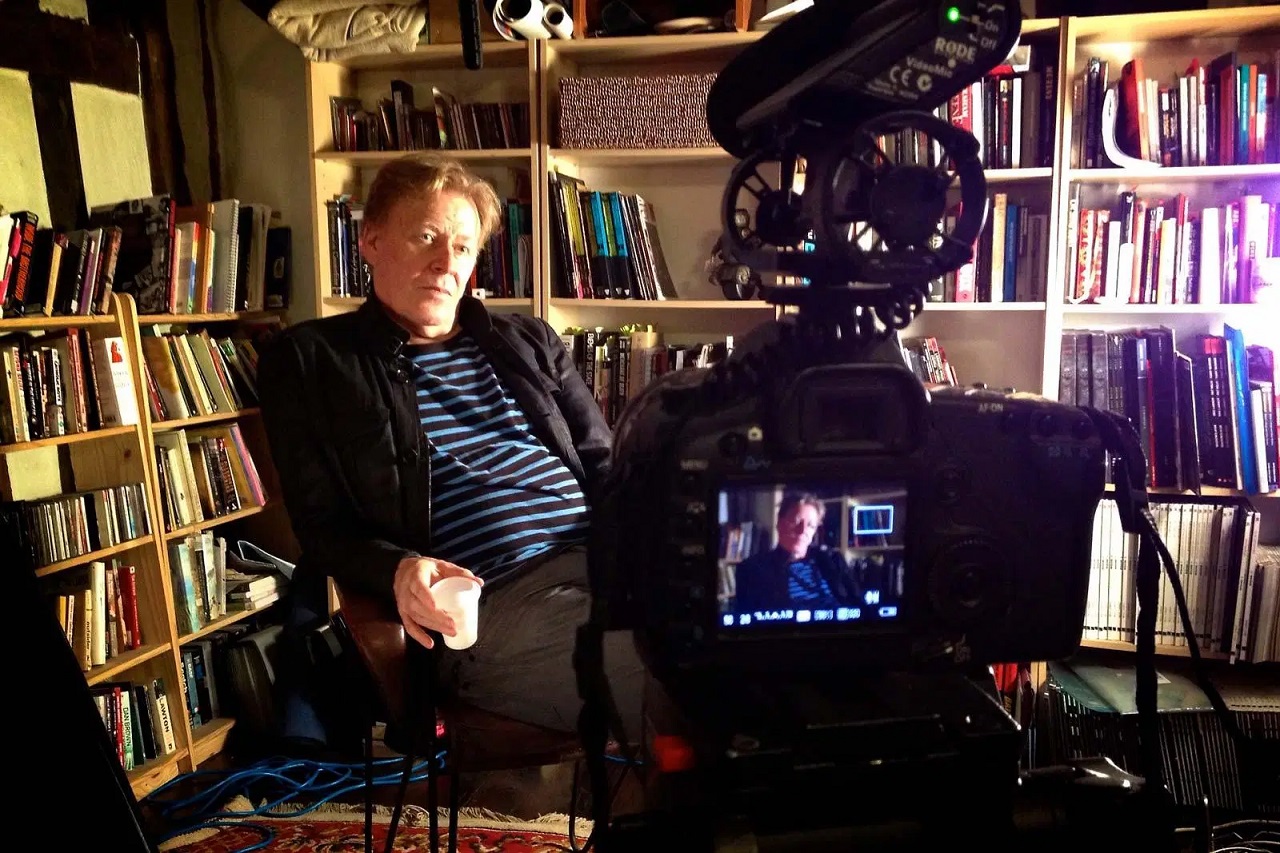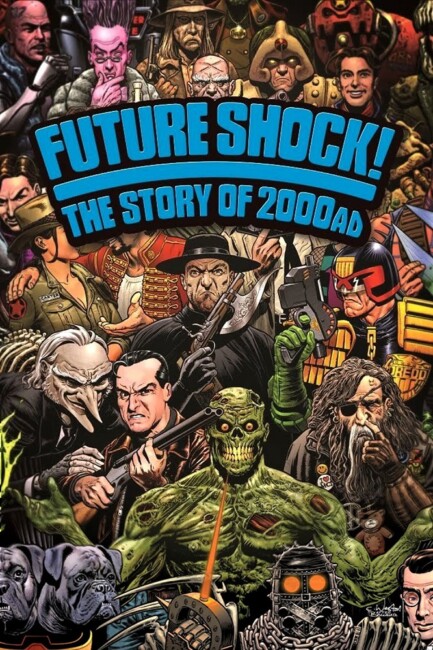Crew
Director – Paul Goodwin, Producers – Sean Hogan & Helen Mullane, Photography – Paul Goodwin, Nick Harwood & Jim Hinson, Music – Justin Greaves, Animation – 3PS (Director – Simon Pike), Title Sequence – Zebra Post. Production Company – Stanton Media/Deviant Films.
Cast
Dan Abnett, Geoff Barrow, Emma Beeby, Karen Berger, Lauren Beukes, David Bishop, Brian Bolland, Will Brooker, Will Dennis, Andy Diggle, D’Israeli, Ian Edgington, Gary Erskine, Carlos Ezquerra, Henry Flint, Neil Gaiman, Lee Garbett, Alex Garland, Dave Gibbons, Alan Grant, Paul Gravett, John Higgins, Scott Ian, Jock, Cam Kennedy, Jason Kingsley, Colin MacNeil, Peter Milligan, Pat Mills, Michael Molcher, Leah Moore, Grant Morrison, Kevin O’Neill, John Reppion, Matt Smith, Bryan Talbot, Karl Urban, Nacho Vigalondo, John Wagner, Chris Weston, Rob Williams, Steve Yeowell)
Future Shock! The Story of 2000AD is a documentary about the history of the British weekly comic-book 2000 AD (1977– ). To those uninitiated as to what 2000 AD is, this is where Judge Dredd was created, it is where Alan Moore, Neil Gaiman, Grant Morrison and a great many other names in comic-book fandom published their first stories or worked before becoming known elsewhere. 2000 AD has published many classic strips over the years, including titles such as Nemesis the Warlock, The Ballad of Halo Jones, Strontium Dog, Slaine and Rogue Trooper.
From the opening featuring stock news footage clips of Margaret Thatcher, Sid Vicious and National Front marches, Future Shock is determined to place 2000 AD is an historical perspective. Many of the interviewees from the early days contrast 2000 AD with the Fleetway publications of the day – weekly British boy’s comics that featured safe, predictable adventures, sometimes science-fiction stories. After starting out with Action, a comic that was killed off before its time because of parental groups protesting about the level of violence, editor Pat Mills created 2000 AD.
Most of the people who ended up working up 2000 AD had a rebel mindset, a determination to crash the barricades – almost everybody who is interviewed takes a pride in seeing 2000 AD as edgy, highly individualistic and readily delving into social commentary. This is perhaps most notable when it came to the creation of Judge Dredd who was designed as an over-the-top parody of fascistic US policing where it seems that the more extreme the writers keep taking it, the more popular the character became – interestingly of which, the artists to create it, including Carlos Ezquerra (who speaks English through such a thick accent that it is near-impossible to understand any of his interview scenes), both didn’t want to develop Dredd any further after coming up with the initial design.
The 2000 AD story takes some interesting turns. Future Shock charts the initial success and the creation of some of the great strips. Pat Mills was the first British weekly comic editor to insist that credits for the artists and writers was given on the stories. This had a knock-on effect when DC’s sideline imprint Vertigo in particular began to come to England to recruit the top talent, resulting in a major brain drain. Not to mention that talent would then sign on to 2000 AD, viewing it only as a stepping stone to greater success and more money in the US.

It does reveal the amazing number of people who had their starts or published early works at 2000 AD and then leapt the ditch to success in the US mainstream – Alan Moore, Brian Bolland, Neil Gaiman, Grant Morrison, Alan Grant, among others. As is said at one point, “there wouldn’t have been a Vertigo without a 2000 AD.” Neil Gaiman, in particular, talks about frustration at the company policy that required them to sign away copyright on their creations – meaning that he gets no royalties from reprints, while Pat Mills also talks about how that has meant that creators are holding back on their best work.
Future Shock also deals with the comic-book’s decline in the 1990s where it was seen as lacking in focus, in part due to the US brain drain, changes of editorial staff and buyouts by other companies who did not understand the product. This period is seen as one where 2000 AD started losing traditional readership and the editorial staff tried to go in different directions to find a new audience, including the infamous Sex Issue and the placement of ads that were regarded as offensive. This period also saw some creative lows, including the universally hated Space Girls strip (an intergalactic version of the Spice Girls) and Blair 1.0, featuring an android Tony Blair in action. The documentary continues with the cautious attempts to get 2000 AD back on track during the 2000s, although not too much is dwelt on this – I would like, for instance, to hear from new editor Matt Smith (no relation to the actor who plays the Eleventh Doctor Who) about how he has turned this around but Smith’s contribution is limited to a single scene.
The documentary also deals with the several occasions upon which 2000 AD has become the basis for film material. The first and worst was the Sylvester Stallone version of Judge Dredd (1995), which completely failed to get the character. Everyone speaks of their dislike of it but praises the subsequent Dredd (2012). Both that film’s star Karl Urban and writer Alex Garland are interviewed and speak about how they made the effort to get the details and feel of the comic-book right this time.
There is also mention of Richard Stanley’s Hardware (1990), which was uncreditedly taken from the one-shot strip Shok! (1980), which 2000 AD sued to retain subsequent credit on re-releases of the film. There are also less obvious works that have drawn their inspiration from 2000 AD – various people draw close analogy between Judge Dredd and Robocop and others between the design of Michael Bay’s Transformers and the ABC Warriors. Spanish director Nacho Vigalondo is interviewed and says how he took the idea for his most celebrated film Timecrimes (2007) from a 2000 AD strip.


